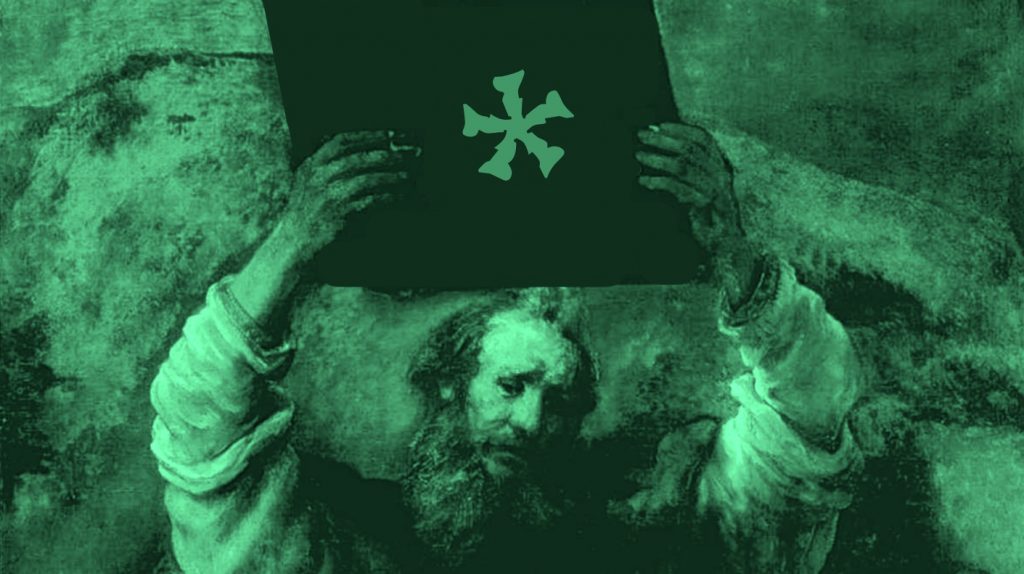
Despite their centrality to Christianity, the Ten Commandments are not even the same set of laws that the Bible describes as the Ten Commandments.
In the Book of Exodus, the god wrote the ten commandments on two tablets of stone and gave them to Moses, who broke them (Ex 32:15-19).
“32:15 And Moses turned and went down from the mountain, and the two tablets of the Testimony were in his hand. The tablets were written on both sides; on the one side and on the other they were written. 16 Now the tablets were the work of God, and the writing was the writing of God engraved on the tablets. 17 And when Joshua heard the noise of the people as they shouted, he said to Moses, “There is a noise of war in the camp.” 18 But he said: “It is not the noise of the shout of victory, Nor the noise of the cry of defeat, But the sound of singing I hear.” 19 So it was, as soon as he came near the camp, that he saw the calf and the dancing. So Moses’ anger became hot, and he cast the tablets out of his hands and broke them at the foot of the mountain.”
The god then recalled Moses to give him the same rules again (Ex 34:1-4).
“34:1 And the Lord said to Moses, “Cut two tablets of stone like the first ones, and I will write on these tablets the words that were on the first tablets which you broke. 2 So be ready in the morning, and come up in the morning to Mount Sinai, and present yourself to Me there on the top of the mountain. 3 And no man shall come up with you, and let no man be seen throughout all the mountain; let neither flocks nor herds feed before that mountain.” 4 So he cut two tablets of stone like the first ones. Then Moses rose early in the morning and went up Mount Sinai, as the Lord had commanded him; and he took in his hand the two tablets of stone.”
And these are the rules that God told Moses: (Ex 34:11-26).
- Do not make treaties with other tribes (34:11-13)
- Do not worship other gods or make moulded gods (34:14, 17)
- Do not intermarry with other tribes (34:15-16)
- Keep the feast of unleavened bread (34:18)
- Give the god the firstborn of your livestock apart from donkeys (34:19-20)
- Rest on the seventh day (34:21)
- Observe three named festivals during the year (34:22-24)
- Do not offer the blood of sacrifice with leaven (34:25)
- Bring the best of first fruits of your ground to the church (34:26)
- Do not boil a kid in its mother’s milk (34:26)
God then told Moses to write down these words, and Moses wrote on two new stone tablets “the words of the covenant, the ten commandments” (Ex 34:27-28).
“34:27 Then the Lord said to Moses, “Write these words, for according to the tenor of these words I have made a covenant with you and with Israel.” 28 So he was there with the Lord forty days and forty nights; he neither ate bread nor drank water. And he wrote on the tablets the words of the covenant, the Ten Commandments.”
The Bible is inconsistent about what sets of rules are what. Today’s Ten Commandments actually appear elsewhere in the Book of Exodus (20:1-17). The Bible does not call them the ten commandments, and they are not written on tablets of stone. Instead, in a different incident, God speaks them directly from Mount Sinai. It seems likely that later leaders chose to downplay the ritual laws, and to instead brand the other set of laws as being “the Ten Commandments.”
In a later story, when Moses is recalling these events, he misremembers the exact words of these laws and mistakenly says that the god wrote them onto stone tablets (Deut 5:6-22). This later story contradicts the Book of Exodus, unless the tablets had twenty laws on them. It seems more likely that the writer of Deuteronomy made mistakes or alterations when transcribing, perhaps centuries later, the Exodus story.
Whether or not the Bible stories are true, neither set of ten commandments is a guide for ethical conduct. Neither is based on universal values of right and wrong, because the rules were never intended to apply to all people. They were designed to protect the stability and interests of one Bronze Age tribe, specifically because this tribe was set apart from all other people.
They did this mainly by regulating how the tribe worshipped its god, by protecting the position of the tribe’s adult males, and by treating members of the tribe differently than strangers. They demanded unthinking obedience, based on desire for amazing rewards and fear of horrific punishments meted out by this god, and enforced by threats of being stoned to death by other members of the tribe.
This is no basis upon which to build an ethical moral code.
Like this article? It is one of a series on this topic.
Click here to read the other articles in this series.